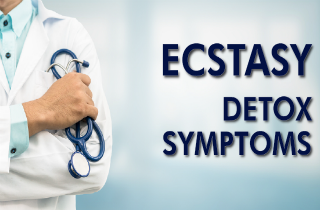Ecstasy is considered a recreational drug. However, research has shown that ecstasy users can become tolerant to ecstasy and/or psychologically dependent on its effects when the drug is taken repeatedly. Although there is no evidence to prove that ecstasy users can create true physical addiction to the drug, detox symptoms can and do occur in both occasional and heavy users. The duration and intensity of the withdrawal symptoms that occur when users reduce or stop taking ecstasy altogether will vary by person.
In this article, we review the most common symptoms that can occur during ecstasy detox and the possible side effects. At the end, we invite your questions and comments about ecstasy detox symptoms. We try to respond to all legitimate queries personally and promptly.
Ecstasy detox: How long?
Ecstasy withdrawal begins to onset once the effects of MDMA (3,4-methylenedioxy-N-methylamphetamine) start to wear off, approximately 3 to 6 hours after last use. If a user goes for a second dose, s/he effectively postpones the onset of the withdrawal symptoms.
While the body tends to get rid of the toxins and withdrawal symptoms resolve within 2-4 days after the last dose, in a few cases, ecstasy withdrawal symptoms can last for weeks and months. The duration of the withdrawal symptoms will vary by person and are connected to the quantity and the period of time during which s/he has been using and abusing ecstasy.
Symptoms of ecstasy detox
The duration and the intensity of the ecstasy detox symptoms can vary by person with heavy users experiencing more intense and uncomfortable symptoms. In rare cases, ecstasy abuse can cause psychosis even in people who do not have previous psychiatric history. While mild symptoms of ecstasy withdrawal do not require medical attention, it is highly recommended for heavy users to be medically supervised when under detox. Still, the most commonly experienced detox from ecstasy symptoms include:
- cravings
- dehydration
- depression
- fatigue
- hallucinations
- irritability
- lack of motivation
- lethargy
- loss of appetite
- trouble concentrating
The protracted withdrawal symptoms which may develop following acute withdrawal include:
- memory loss
- muscle tension
- anxiety
- insomnia
Ecstasy detox side effects
To begin, a person undergoing ecstasy detox should consult a medical professional. Medical doctors and psychiatrists are able to determine the safest way to detox depending on the person’s needs and overall medical condition. Physical and psychological assessments will help doctors create an individualized treatment plan for you, with necessary follow up and long term care. And while occasional users may not require medical assistance to complete detox from ecstasy (becoming physically dependent on ecstasy is rare), heavy users most certainly do so.
Furthermore, it is of utmost importance to be prepared and motivated to undergo detox and be surrounded with close and sober people as fellow users could trigger addictive behavior. Most importantly, stay hydrated and keep track on the body temperature to avoid further complication.
Questions about ecstasy detox
In this article we tried to cover the most common symptoms of ecstasy detox and the possible complications that may occur. If you have additional questions regarding ecstasy detox symptoms or experiences to share, please write to us in comment section below. We will try to get back to you personally and promptly.









Related Posts